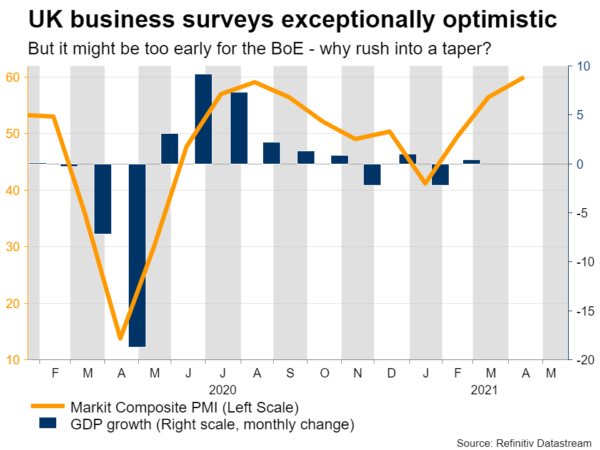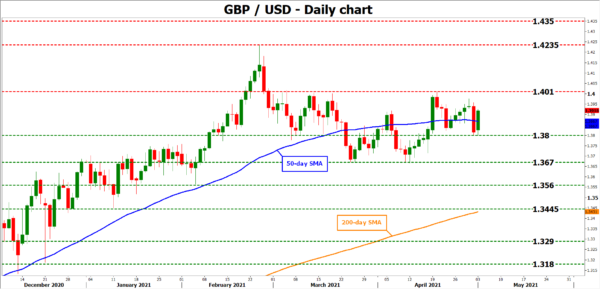The BoE will publish its latest rate decision at 11:00 GMT Thursday alongside updated economic forecasts, which Governor Bailey will present during his press conference. The British economy is doing much better and there’s speculation the Bank might signal a slowdown of its asset purchases. That could propel the pound higher, but whether any gains are sustained will also depend on the Scottish elections on the same day.
Reaping the rewards of vaccinations
The United Kingdom is finally ready to put the pandemic nightmare behind it. The economy has now reopened thanks to a lightning-fast vaccination program, and the powerful relief measures from the government have ensured the crisis won’t leave any lasting scars.
Indeed, the British economy seems to be gaining momentum. Retail sales rose above their pre-pandemic levels in March, signaling that consumers are thirsty to spend again, while PMI business surveys are hovering near multi-year highs, pointing to a spell of strong growth ahead.
Additionally, the BoE’s worst fears about unemployment never materialized. The government has extended the Job Retention Scheme until September, diminishing the risk of an imminent spike in joblessness.
Taper time? Maybe not
Turning to the upcoming meeting, there’s a lot of buzz that economic forecasts will be upgraded to reflect the smooth re-opening and successful vaccine rollout. In turn, that could lead the Bank to signal a slowdown in its asset purchase program, as the economy no longer needs an overload of liquidity.
Will the Bank of England follow the Fed in saying that it’s still too early to consider a QE exit, or will it follow the Bank of Canada and signal that tapering is coming? It’s a close call, with solid arguments on both sides.
From a risk/reward perspective, it seems more prudent to wait. The economy might be doing better, but there are still several risks the BoE must grapple with, like a potential surge in unemployment once government support is withdrawn in September and risks around vaccine-resistant variants. Indeed, rushing into a tapering decision might even backfire, by sending UK bond yields soaring and raising borrowing costs prematurely, kneecapping the recovery.
Mind the political storm clouds
If the BoE indeed decides to wait until August before announcing any major policy shifts, sterling is likely to drop on the news. Taking a technical look at pound/dollar, initial support to declines may be found near the 1.3800 region, where a break would turn the focus towards the recent lows around 1.3670.
On the other hand, if the BoE pulls the trigger and signals a slowdown in QE purchases, that could catapult Cable towards the 1.4010 region. If violated, the next target may be the February peak of 1.4235.
Even if the BoE does taper and the pound rallies, some political risk might quickly dampen the enthusiasm. Voters in Scotland will elect their new Parliament on Thursday, and opinion polls suggest a clear majority for pro-independence parties. If so, the political battle for a second Scottish referendum will likely commence.
That would be a major headache for Prime Minister Johnson, potentially forcing markets to price a political risk premium back into the pound. There are also local council elections across England on the same day and any signs that Johnson’s Conservatives are losing ground could be another problem for sterling.


